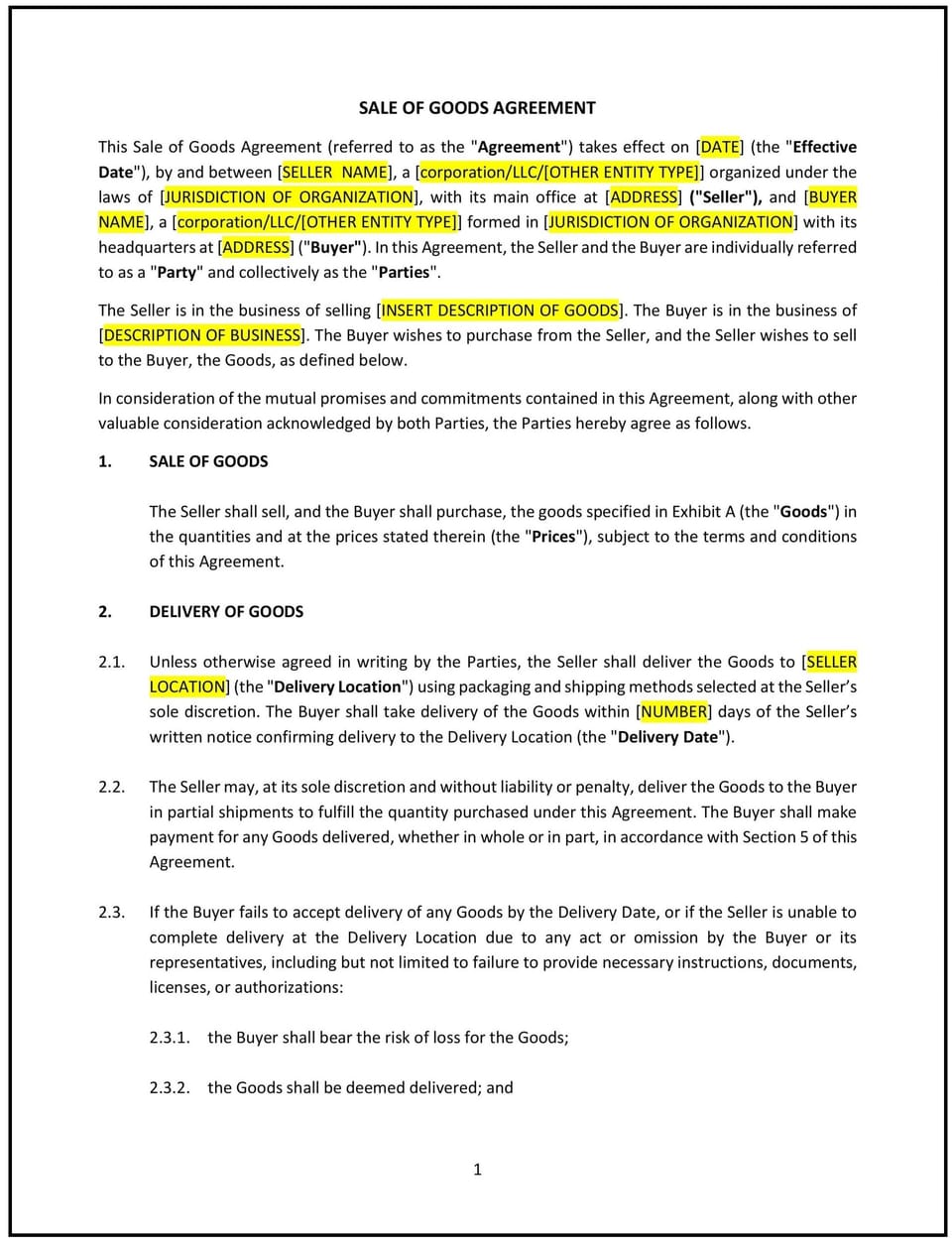Sale of Goods Agreement (Pro-Seller) (Tennessee): Free template

Sale of Goods Agreement (Pro-Seller) (Tennessee)
A Sale of Goods Agreement (Pro-Seller) in Tennessee is a legally binding contract that establishes the terms under which a seller supplies goods to a buyer. This agreement is designed to protect the seller’s interests by outlining payment obligations, delivery terms, risk allocation, and liability limitations. It is widely used in industries such as manufacturing, wholesale distribution, e-commerce, and retail, where businesses sell physical goods regularly.
Tennessee businesses use this agreement to ensure payment security, reduce disputes over product quality, and establish legally enforceable sales terms. A well-drafted agreement protects sellers from issues such as late payments, product returns, and liability for lost or damaged goods. Tennessee follows the Uniform Commercial Code (UCC) Article 2, which governs sales transactions and allows sellers to disclaim certain warranties, specify delivery obligations, and enforce payment terms.
For sellers operating in Tennessee, this agreement provides a legal framework that protects revenue and business interests, ensuring that transactions proceed smoothly while offering flexibility to customize terms based on business needs.
Tips for drafting and maintaining a Sale of Goods Agreement (Pro-Seller) in Tennessee
- Clearly define the goods being sold, including specifications, quantity, pricing, and acceptable quality standards to prevent disputes.
- Establish payment terms that protect the seller, including required deposits, invoicing timelines, penalties for late payments, and acceptable payment methods.
- Specify delivery terms such as shipping responsibilities, transfer of risk, and liability for lost or damaged goods. Tennessee follows the UCC’s rule that risk of loss generally passes to the buyer upon delivery unless otherwise agreed.
- Limit seller liability by disclaiming implied warranties under the Tennessee UCC unless the seller explicitly offers guarantees. This protects the seller from claims regarding product defects.
- Include a return and refund policy that specifies whether returns are allowed and under what conditions. Tennessee law allows sellers to set no-return policies as long as they are clearly stated in the contract.
- Incorporate a force majeure clause to protect the seller from liability if events beyond their control, such as supply chain disruptions or natural disasters, delay or prevent fulfillment of the agreement.
Frequently asked questions (FAQs)
Q: What should Tennessee businesses include in a Sale of Goods Agreement (Pro-Seller)?
A: Businesses should include product descriptions, payment terms, delivery obligations, warranty disclaimers, risk of loss terms, and liability limitations to protect the seller.
Q: How does a Sale of Goods Agreement (Pro-Seller) benefit Tennessee sellers?
A: It protects sellers from disputes over product quality, late payments, and liability while ensuring that payment and delivery terms are legally enforceable.
Q: Are disclaimers of warranties enforceable in Tennessee?
A: Yes, under the Tennessee Uniform Commercial Code (UCC) Article 2, sellers can disclaim implied warranties such as the warranty of merchantability and fitness for a particular purpose, but they must do so clearly in writing.
Q: What happens if a buyer refuses to pay under a Sale of Goods Agreement in Tennessee?
A: The seller can enforce payment terms through legal action, which may include contract damages, repossession of goods, or interest penalties on late payments.
Q: How should Tennessee sellers handle disputes under a Sale of Goods Agreement?
A: Sellers should include a dispute resolution clause specifying whether disputes will be handled through arbitration, mediation, or Tennessee courts.
Q: Does Tennessee require sales tax on goods sold under this agreement?
A: Yes, most sales of tangible goods in Tennessee are subject to Tennessee sales and use tax laws, and sellers must collect and remit applicable taxes unless an exemption applies.
Q: Can a seller refuse returns under a Sale of Goods Agreement in Tennessee?
A: Yes, the agreement can specify no returns or limited returns as long as this policy is clearly disclosed to the buyer in the contract.
This article contains general legal information and does not contain legal advice. Cobrief is not a law firm or a substitute for an attorney or law firm. The law is complex and changes often. For legal advice, please ask a lawyer.


